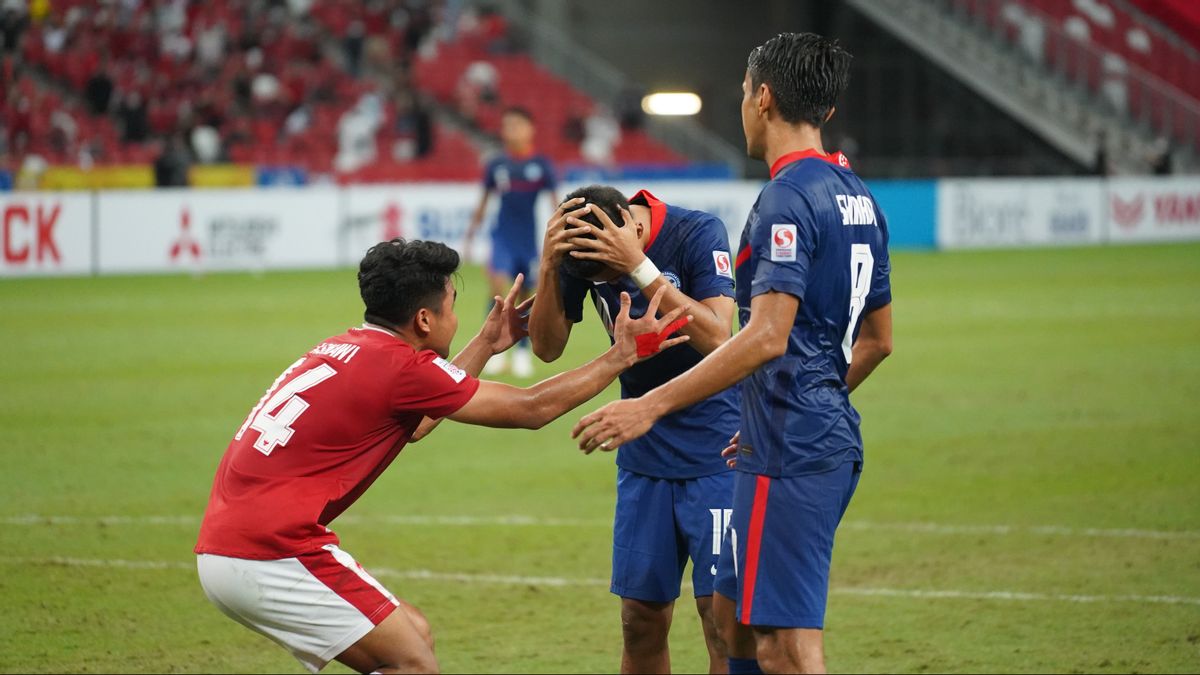JAKARTA - The 2020 AFF Cup gave birth to a series of controversial decisions from the referee. Following that, questions arose about why the video assistant referee (VAR) was not used.
The semi-final second leg match between Indonesia and Singapore may be one of the most stressful in the history of the national team in the AFF Cup. Like a roller coaster.
The game was marked with three red cards for Singapore. The first red card was issued by referee Qasim Matar for defender, Safuwan at the end of the first half.
This red card is an accumulation because previously Safuwan had received a yellow card. The second red card for Singapore was given to Irfan Fandi in the 67th minute.
Irfan Fandi committed a serious violation against Irfan Jaya. Irfan Fandi, in his position as the 'last man', elbowed Irfan Jaya in the face and made the agile Indonesian winger miss the chance to face the Singapore goalkeeper one on one.
With nine, Singapore was still able to fight 2-2, even forcing Indonesia to play into extra rounds. In extra time, the third red card came out for the Singapore goalkeeper, Hassan Sunny.
The red card ended Hassan Sunny's super appearance guarding Singapore's goal throughout the match. Team striker, Ikhsan Fandi finally replaced Hassan Sunny in goal. The match ended with a score of 4-2 for Indonesia.
Singapore media critique
A number of decisions by referee Qasim Matar which were considered detrimental to Singapore were highlighted by the local mass media. Safuwan's red card, for example.
Although it was acknowledged that the second yellow card was correct, Singaporean media Mothership considered that Safuwan's tackle on Witan Sulaeman in the 36th minute did not deserve a yellow card. Mothership also thought Singapore should have had a penalty in the 40th minute.
At that time Amy Recha was tripped by Rachmat Irianto in a sacred box. Mothership wrote that Irianto's tackle did not hit the ball but hit Amy's left foot.
Singapore's second red card which forced Irfan Fandi to take a shower early in the 67th minute was also considered inappropriate. Despite believing it was a violation, Mothership considered a red card not the right reward for Irfan Fandi.
Another thing Mothership criticized was Arhan's Primary goal. Mothership assessed that Indonesia's equalizer in the 87th minute was offside. The debate about the decisions above is also warmly voiced by Singaporean netizens. They question why there is no VAR.
Controversial decision in another game
Another semifinal match, which brought together Thailand and Vietnam, was also colored by controversy. What happened to Nguyen Quang Hai, for example. In the 17th minute, the Vietnamese star was elbowed by a Thai player, Theerathon Bunmathan. The referee ignored the foul.
Another controversial decision occurred in the 44th minute. Thailand were 2-0 up when Vietnam's Nguyen Van Toan ran to meet a through ball. Thailand goalkeeper Chatchai Bootprom then came out of the penalty area and pulled Nguyen Van Toan's shirt to the ground.
Referee Saoud Ali Al-Adba awarded Chatchai Bootprom a yellow card. Various controversial decisions that invite strong reactions. The Southeast Asian Football Federation (AFF) even fired the Qatari referee. The 35-year-old man will no longer be used in the remainder of the 2020 AFF matches.
Reported by The Thao, Saoud also got terror from Vietnamese supporters on his social media. Saoud's Facebook account was even hacked by an anonymous who was also suspected of being a supporter of the Vietnam team.
Why is there no VAR?
A Vietnamese media, Zing News conducted a search on why VAR was not used in the 2020 AFF Cup. According to Zing News, the AFF Cup committee had actually coordinated with all federation members regarding the use of VAR in the 2020 AFF Cup.
However, according to Zing News, the biggest problem with using VAR is cost. "Although the AFF does not give specific figures, the amount of money to organize matches with VAR is always large," reads the news published Friday, December 24.
How much does VAR cost? Referring to the cost of using VAR, which is planned to be implemented by PT Liga Indonesia Baru (LIB) in Liga 1 next season, the price for a VAR set is around Rp. 6 million US dollars. That figure is equivalent to Rp. 85 billion.
Procurement of VAR requires a large budget. Reflecting on the plan of PT Liga Indonesia Baru (LIB) to use VAR in Liga 1 next season, the price of a set of VAR can reach IDR 6 million US dollars or equivalent to IDR 85 billion.
This amount includes the complete VAR package, which consists of equipment procurement and operating training costs. Like other technologies, VAR requires good infrastructure support. Special licenses for referees are also required.
Launching Bola.com, in Southeast Asia there are actually two referees who have a VAR license. One from Singapore, Muhammad Taqi Aljaafari and Bui Thi Thu Trang, a female referee from Vietnam. Both were not involved in this year's AFF Cup.
Detailing the list of referees, the committee used eight referees from West Asia, two from South Korea, as well as referees from Singapore and Malaysia, one each.
*Read other information about FOOTBALL or read other interesting articles from Yudhistira Mahabharata.
Other BERNASThe English, Chinese, Japanese, Arabic, and French versions are automatically generated by the AI. So there may still be inaccuracies in translating, please always see Indonesian as our main language. (system supported by DigitalSiber.id)









